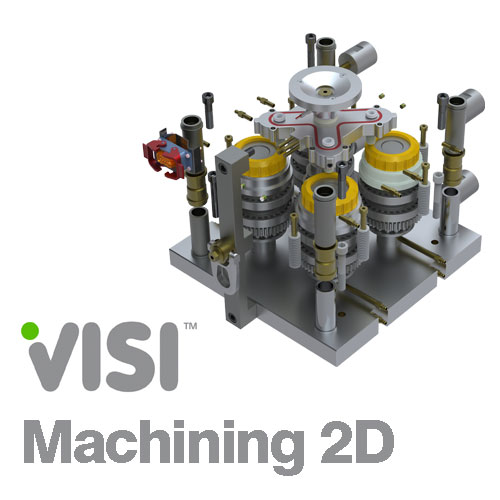Products
VISI Machining 2D provides a practical, intuitive and simple solution for CNC programming including 4 and 5 axis indexing.
VISI Machining 2D provides a practical, intuitive and simple solution for CNC programming including 4 and 5 axis indexing. Knowledge based feature recognition will automatically select features directly on the solid geometry and create reliable milling and drill cycle toolpaths.
Features at a glance:
Extensive CAD interfaces
Comprehensive tool library
Pocketing, milling & face milling operations
Multi level nested pockets
Automatic residual stock
Full range of drilling cycles
Optimised toolpath movement
Obstacle management
Kinematic simulation
Customisable postprocessors
Reliable & efficient NC code
HTML & XLS report output
Extensive range of CAD interfaces and powerful modelling. VISI can work directly with Parasolid, IGES, CATIA v4 & v5, Pro-E, UG, STEP, Solid Works, Solid Edge, ACIS, DXF, DWG, STL and VDA files. The extensive range of translators ensures that users can work with data from almost any supplier. Companies working with complex designs will benefit from the simplicity with which their customer's CAD data can be manipulated. VISI can work directly with wireframe, solid, surface and mesh data or a combination of all four, providing the user with tools to work with any CAD model or to quickly construct the information from paper drawings ready for 2D machining.
Simple programming and comprehensive tool management. The intuitive operation manager has a simple tree structure displaying the machining operations and the selected tools from the comprehensive tool library. Based on piece and tooling material, many machining parameters are calculated automatically, including feeds, speeds, stepover and depth of cut. A highly graphical interface guides the user through the machining parameters, cutting conditions and holders for the selected tooling. Multiple origins enable the data to be quickly orientated around any datum or set-up for multi-axis indexing.
Full range of drilling cycles. Centre drilling, drilling, tapping, reaming, boring, helical milling, thread milling and mill drill cycles give the user a wide choice of operations to cover any combination of hole type. Selection of diameters and depths directly from the model makes it easy to enter drilling parameters and eliminate the possibility of MDI errors. Optimisation of the toolpath movement ensures the shortest distance for tool travel and reduces cycle times offering maximum productivity.
Profile and face machining operations. The profiling operations give a choice of machining direction, circular or direct approach, and the ability to cut down to a depth with a sequence of profiling moves. Cutter radius compensation capability provides practical CNC code for use on the shop floor. When the cutter cannot machine tight internal radii, the system will automatically create residual stock geometry (defined by the previous tool) and enable re-machining with a smaller tool. Spiral or zigzag face milling operations, with internal island nesting provide a choice of methods to clean up planar faces. Milling by successive passes allows the user to mill a profile and start away from the material, gradually moving inwards using a stepover parameter.




